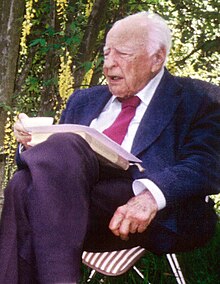
Back Hans-Georg Gadamer Afrikaans Hans-Georg Gadamer AN هانز جورج جادامير Arabic هانز جورج جادمير ARZ Hans-Georg Gadamer AST Ханс-Георг Гадамер Bulgarian Hans Georg Gadamer BS Hans-Georg Gadamer Catalan Hans-Georg Gadamer Czech Hans-Georg Gadamer Danish
Hans-Georg Gadamer | |
|---|---|
 Hans-Georg Gadamer, c. 2000 | |
| Born | 11 February 1900 |
| Died | 13 March 2002 (aged 102) |
| Alma mater | University of Breslau University of Marburg |
| Era | 20th-century philosophy |
| Region | Western philosophy |
| School | |
| Institutions | University of Marburg (1928–1938) Leipzig University (1938–1948) Goethe University Frankfurt (1948–1949) University of Heidelberg (1949–2002) |
| Thesis | The Nature of Pleasure According to Plato's Dialogues (1922) |
| Doctoral advisor | Paul Natorp |
| Notable students | Charles Guignon Emilio Lledo |
Main interests | |
Notable ideas |
|
Preview warning: Page using Template:Infobox philosopher with unknown parameter "influences"
Preview warning: Page using Template:Infobox philosopher with unknown parameter "influenced"
Hans-Georg Gadamer (/ˈɡɑːdəmər/; German: [ˈɡaːdamɐ]; 11 February 1900 – 13 March 2002) was a German philosopher of the continental tradition, best known for his 1960 magnum opus on hermeneutics, Truth and Method (Wahrheit und Methode).
- ^ Jeff Malpas, Hans-Helmuth Gande (eds.), The Routledge Companion to Hermeneutics, Routledge, 2014, p. 259.
- ^ Hans-Georg Gadamer, "Towards a phenomenology of ritual and language", in Lawrence Kennedy Schmidt (ed.), Language and Linguisticality in Gadamer's Hermeneutics, Lexington Books, 2000, p. 30; James Hans, "Hans-Georg Gadamer and Hermeneutic Phenomenology," Philosophy Today 22 (1978), 3–19.
- ^ "Hans-Georg Gadamer", Stanford Encyclopedia of Philosophy